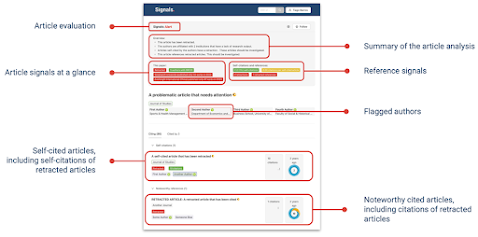The judges have selected a shortlist of four for the 2024 ALPSP Award for Innovation in Publishing. This year's awards are sponsored by PA EDitorial.
The finalists will be showcased in a lightning session at the ALPSP Conference on 11 September. The winners will be announced at the ALPSP Conference Awards Dinner on 12 September in Manchester.
In this series, we hear from each of the finalists.
Tell us about your organization
Signals is a London-based startup, launched in December 2023, on a mission to restore trust in research. We are a team of former researchers with a deep interest in scholarly publishing and research integrity, and a proven track record of building products for publishers and researchers. Signals is already helping publishers to identify problematic articles at submission and in their portfolios.
What is the project/product that you submitted for the Awards?
Signals addresses the pressing need of tackling publishing integrity issues that are eroding trust in research. These issues are difficult to detect at scale, but Signals aims to help solve this problem by providing researchers and publishers with the information they need to understand the trustworthiness and value of research articles. Our product analyses published articles, manuscripts, and entire journals, to help publishers and researchers improve their research integrity workflows and make rapid, informed decisions on articles they are working with.
Tell us a little about how it works and the team behind it
Signals evaluates research articles by surfacing signals from the complex networks of articles, authors, institutions, and citations, combined with signals from experts, including sleuths and researchers.
The Signals team has deep expertise in the scholarly publishing industry. Co-founders Andrew Preston, Elliott Lumb, and Tiago Barros bring extensive experience in building products for publishers and researchers from their previous roles at Publons, PeerRef, Faculty Opinions, and Sciwheel. Lead Engineer, Florin Asăvoaie, was the Solutions Architect for Hindawi’s Phenom platform. His engineering expertise and experience in the industry are accelerating Signals’ development. Nicko Goncharoff, our Commercial Lead, has over two decades of commercial experience in STM research software and publishing. Finally, Christos Petrou, with his expertise in scholarly publishing analytics, provides Signals with invaluable contributions on developing and refining our signals.
In what ways do you think it demonstrates innovation?
Signals has a unique and innovative strategy to restore trust in research, based on these key pillars:
- Positioning: Signals is built for the entire research community. Research integrity doesn’t just affect publishers. It affects researchers, institutions, and anyone engaging with research. To restore trust in research it’s essential that everyone has access to the information they need to evaluate research.
- Network: Signals has a novel approach to evaluating research articles. By using a combination of insight from the networks of article metadata and contributions from experts, our data graph improves over time as the scholarly record grows and articles are cited and engaged with. Using this approach, our product currently flags 89% of known problematic articles.
- Transparency: Signals evaluations are transparent and actionable. We show why articles are potentially problematic and provide the necessary context to understand the basis of the evaluation. This enables individuals to make rapid and informed decisions on articles and simultaneously recognize and report false positives, enabling us to constantly improve Signals’ accuracy.
- Trust: Signals doesn’t just flag potential issues, it also show why articles are trustworthy. This enables individuals to spend less time evaluating every article for potential issues, improving workflows.
What are your plans for the future?
We’re focused on addressing the urgent challenges faced by publishers. In the near future, we plan to extend our offering to research institutions, helping them to play a decisive role in identifying and preventing research fraud. There is a clear need to expand the use of Signals across the research ecosystem, to provide article-level insight for anyone engaging with research, including pharmaceutical companies, government, and healthcare professionals. Our goal is to amplify trustworthy, valuable research that advances our knowledge and supports progress.
About the author
Elliott Lumb, Co-Founder, Signals.Elliott is a Co-Founder of Signals. He has a PhD in medicinal chemistry, had several roles at Frontiers, consulted for publishers on their Open Access portfolio, and was the founder of PeerRef.

.png)



No comments:
Post a Comment